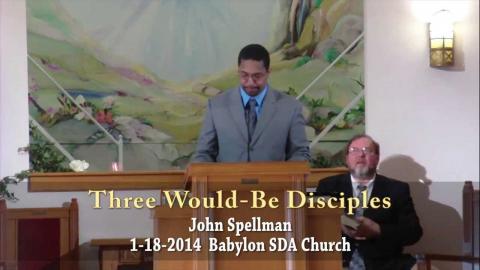The Holy Ghost In The Godhead

By: John Spellman
7 Points to prove or disprove the Holy Ghost in the Godhead Scripturally (With the Bible Only)
I. Would have to be on the same level with God
II. Would have to have been a part of creation
III. Would have to have Divinity (like Jesus and the Father)
IV. Would have to have a separate embodiment
V. Would need personal characteristics (Characteristics that only a person could have)
VI. Would need a personality (1st person narrative, feelings & emotions, self-consciousness, independent thought, and referred to as a person.)
VII. Would need to have a will (to have desires, be able to make independent choices, to have “will power”)
- Is the Holy Ghost on the same level with God?
- Acts 5:3-4 states that in lying to the Holy Spirit you lie to God.
- Matthew 12:31 states that to blaspheme the Holy Ghost is the unpardonable sin.
- Matthew 28:19 states that we are to baptize in the name of the Father, the son, and the Holy Ghost.
- 1 John 5:7, 8 states that there is the Father, the Word, and the Holy Ghost and these three are one.
- 2 Corinthians 13:14 the three are mentioned in the closing remarks of Paul.
- There are 3 which bare record.
- These texts depict the Holy Spirit as being on the same level with God. In the 2nd text one can blaspheme Jesus and be forgiven but to blaspheme the Holy Ghost is unpardonable. This shows that the Holy Ghost must be at least equal in status to Jesus.
- We are baptized in the name of all 3. If the Holy Ghost isn’t a person he can’t have a name, and why would the Father and Jesus [the word] have listed a 3rd name unless all 3 were of equal authority or at least of the same hierarchy of authority. For example: one wouldn’t say In the name of the CEO, the CEO and the executive producer. The executive producer would be a lesser person and nothing for that company would be done in his/her name. One wouldn’t say in the name of the King, in the name Prince and in the name of the throne [place the name of any inanimate object here (throne is just an example)]. If the throne isn’t a person it can’t have a name; a throne is an inanimate object. So for the Holy Ghost to have a name amongst the Father and the Son, it suggests his personality and place in the Godhead.
- We are also told multiple times in scripture that these three are one (another words united in purpose).
- Was the Holy Ghost a part of creation?
- Genesis 1:2 states that the spirit of God moved upon the face of the waters. The Holy Ghost was definitely present.
- Genesis 1:26 God says let “us” make man in our image. Implying that more than one (God plural) took part in the creation of man. John 1:1-14 tells us that Jesus was in the beginning and took part in creation. “All things were made by him”. Job 33:4 states “The spirit of God hath made me”. The Holy Spirit took part in the making of man. All 3 were present in creation and took part in making man.
- Job 26:13 states “His spirit hath garnished the heavens.” This is another example of the spirit taking a part in creation.
- Does the Holy Ghost have Divinity? (Is the Holy Ghost like the Father & the Word?)
In order to have Divinity the Holy Ghost must have the characteristics of God: Omniscience, Omnipresence, and Omnipotence. He must also be eternal. It would also help to prove or disprove the Holy Ghost having received any type of worship.
a) Eternal
- Hebrews 9:14 calls the Holy Ghost an “everlasting Spirit”.
- John 14:16 states the Holy Spirit abides in us forever.
b) Omniscience (All Knowing)
- 1 Corinthians 2:10-11 states that the Spirit searches and knows the deep things of God.
- Also see John 16:13,14
c) Omnipotent (All Powerful)
- Luke 4:14 states that Jesus had to give up all his power to become human. The Holy Ghost gave him power and when we get baptized the Holy Ghost gives us power. This scripture says, “Jesus returned in the power of the Spirit…” The Spirit has power.
- See Romans 15:19
- Luke 1:35 as the spirit comes upon Mary, the power of the most High overshadows her so from these texts we see that the Spirit is all powerful: Omnipotent. Further examples can be seen in stories such as Samson when the Holy Spirit comes upon him.
d) Omnipresent (In All Places: Everywhere)
- Psalms 139:7-10 “Whither can I go from thy Holy Spirit?” a statement made by David. This text goes on to suggest that the Holy Spirit is everywhere: in heaven, in hell, the sea, in darkness, etc. The Holy Spirit is everywhere!
- Here we see that the Holy Ghost has all the traits required to say that he has the Divinity of God. This not only gives him Godly characteristics but puts him at the same level as God and thus makes him God. Keep in mind none of the heavenly beings are FROM everlasting, nor did they take part in creation, nor are they all powerful and all knowing. NONE of them is able to be in different places at the same time (Omnipresence). “I am the Lord thy God there is none like me”. If the Holy Ghost has God’s characteristics he would be like God. There is none like God so the Holy Ghost has to be God.
- Does the Holy Ghost have a separate embodiment?
- Luke 3:22 and Matthew 3:16, 17 are two scriptures that show the Father, Jesus, and the Holy Ghost present at the baptism of Jesus. All 3 are present but in different places. The Holy Ghost is descending, the Father is in heaven, and Jesus is in the water. The Holy Ghost is not in heaven or on earth. The Holy Ghost is in the “in betweens” of heaven and earth coming down (descending). The Father’s voice is heard from heaven. This shows that the three can be in separate places at one time. They do not have the same embodiment; they can be physically separate from each other.
- Now, currently, the Holy Ghost is on earth with us. Jesus and the Father are in heaven.
- The Holy Ghost was “sent” to us. If the Holy Ghost can be sent to us that means that the Holy Ghost must be embodied differently. Jesus was sent and when he returned to heaven he sent the Holy Ghost on the day of Pentecost.
- All 3 can be in different places. This means they all have different embodiments and are not embodied in one “body”; they are one because they are united and function as one.
- Does the Holy Ghost have any personal characteristics?
- John 14:16-17, 26 states that we will receive “another comforter”. Comforter can be translated as helper also. This job is a job that is usually occupied by a person. These verses refer to the comforter as a he and while it could be argued by Trinitarian critics that paraclete is a masculine noun (thus giving an attempt to justify the he), the translation of the word “another” in this context means “one like unto the first”. There is a different word in Greek for another when it means “another” but “a different kind of”. So in this context Jesus promises “another comforter like unto the first [the first being Jesus himself]”. If the comforter to come is like Jesus the comforter must be a divine person! Otherwise there would be a difference and the comforter would not be “like unto the first”. If an angel was sent, the angel would be a different kind of comforter. If a book was sent (being an in animate object) it would be a different kind of comforter. If the Holy Ghost is not God then there would be a different comforter in that the embodiment, divinity, and form/type of help would all be different. So the comforter MUST have the characteristics of Jesus because the comforter is “like unto the first”.
- Acts 5:3, Acts 5:9, John 14:26, John 15, 26 and Acts 13:4 all list characteristics of the Holy Ghost that only a person can have. The Holy Ghost teaches, instructs, sends people places, guides people, reproves, searches things, impresses things on people and speaks. The Holy Ghost can be lied to, tempted, and provoked. The Holy Ghost is called a helper, a witness, and is referred to as “living water”. The term “living water” proves or at the very least suggests that the Holy Ghost is alive. Romans 8:26 suggests that the Holy Ghost is an intercessor.
- This is by no means a comprehensive list. The point is that the Holy Ghost does things that only a person can do. The Holy Ghost has personal jobs and traits only attributed to people. For example, a book can’t teach you, but you can learn from a book. All of these jobs and characteristics are followed by the pronoun “he”.
- Does the Holy Ghost have a personality?
To prove the Holy Ghost has a personality one must show evidence that the Holy Ghost has self consciousness, personality as in emotions, thoughts, & feelings, and that the Holy Ghost is referred to as a person.
- Acts 13:2 is a text where the Holy Spirit refers to himself as “me” and “I”. This is called 1st Person narrative. It shows the Holy Spirit is self conscious.
- The Holy Spirit is called “He” NUMEROUS TIMES throughout scripture though the Hebrew word “Ruawch” is a feminine word for “spirit” and the New Testament Greek word “Pnuema” is a neutral word for “spirit”. There is no reason to call the Holy Ghost a “he” unless the Holy Ghost is a “he”. The idea that he is God’s spirit, as some suggest, does not justify the use of the pronoun “he” because nothing else belonging to God is referred to as “he” with the exception of God’s son because Jesus is a “He”. For example, God’s power, God’s throne, something God audibly speaks, God’s glory, etc. All of these are inanimate things of God none of which are referred to as “he”. The Holy Ghost is the only one referred to as “he” besides God’s son. The Holy Ghost is definitely OVER personified in scripture. The Bible goes out of its way to call the Holy Ghost “he” instead of it.
- Ephesians 4:30 states that the Holy Ghost can be grieved. You can’t grieve a book. You can’t grieve a car. You can’t grieve a door. You can’t grieve any inanimate non living object. You can’t grieve a plant so you can’t grieve a living object without a personality. This shows that the Holy Ghost has feelings.
- Jesus tells us, “He will not speak of himself”. If the Spirit is supposed to be an “it” why would Jesus use “he” in reference to the Holy Spirit speaking of “himself”. You can’t speak of yourself unless you’re a living being having a self to speak of.
- The Bible goes out of its way to OVER personify the Holy Spirit. This is why we can rest assured that the Holy Ghost is a 3rd person or personality. He is also on the level with God (being one or united) thus is the third person in the Godhead.
- Can the Holy Ghost “will”? (will power; ability to make independent choices)
“Will” is what we have. It gives us the ability to choose. If the Holy Spirit has a will (or will power) that means he can think independently though he is one with God. For example: Jesus could say, “Not as I will, but as thou will” or “not as I want/wish/desire but as thou want/wish/desire”. Jesus has his own independent will and so does the Father. The question is does the Spirit have the ability to make choices on his own? We need only to find an example of when “he [the Holy Ghost] wills”. In fact, if one can prove that the Holy Ghost can will this would be the most important point of the 7. It would immediately prove the other 6 points.
- 1 Corinthians 12:11 states that the spirit wills!!! He chooses which spiritual gifts to give out, “as he will”! The spirit makes the choice himself. He has the will power to make his own choice.
- Acts 15:28 states that “It seemed good to the Holy Ghost…” again showing that the Holy Ghost can choose and can reason on his own. It’s the same as saying, “It seemed like a good idea to the Holy Ghost…” He has a will, a desire, and can choose! This shows independent thought, a characteristic ONLY a person could have.
- The above texts show that the Holy Ghost is making decisions not God the Father or the Son in these cases.
These 7 points show the Holy Ghost as the 3rd member of the Godhead scripturally. One can not prove or disprove the Holy Ghost as a member of the Godhead without acknowledging these points.
- Log in to post comments




